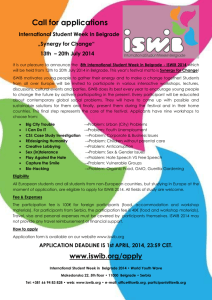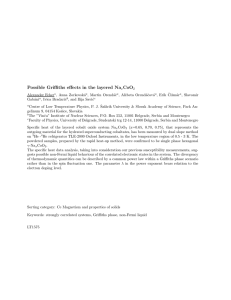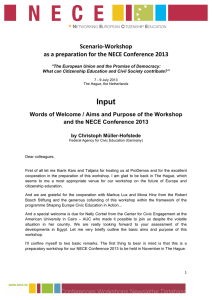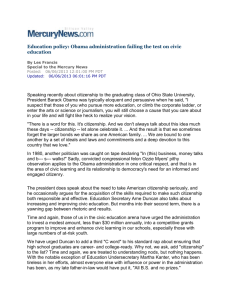A preparatory workshop for the NECE Conference in Vienna 2014
advertisement
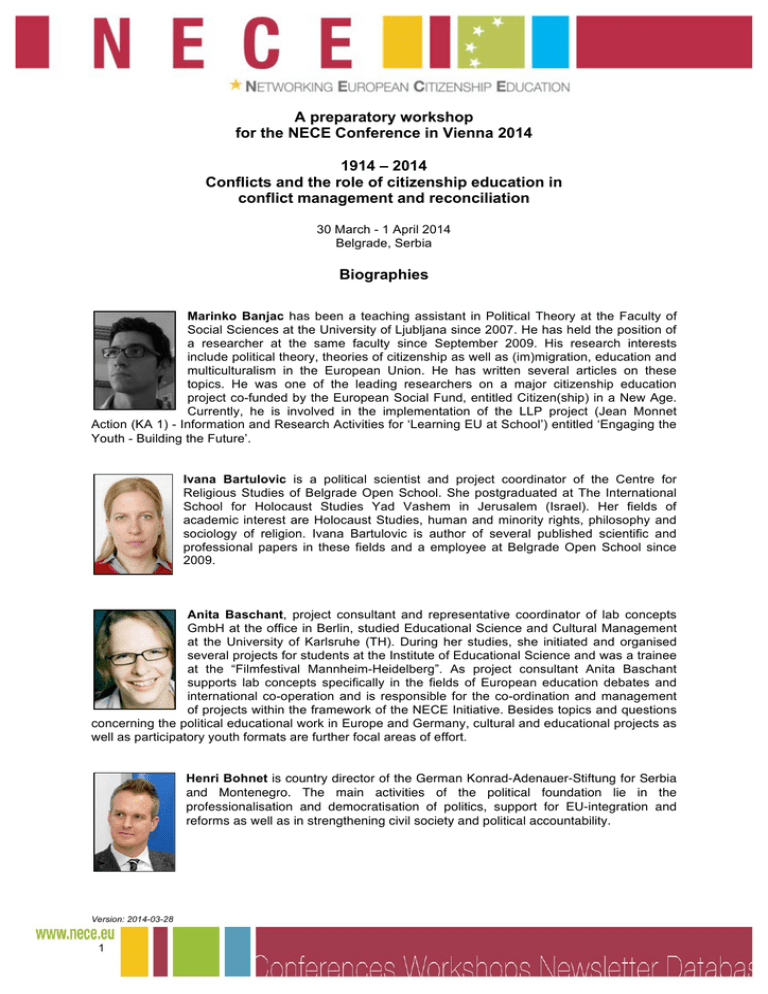
A preparatory workshop for the NECE Conference in Vienna 2014 1914 – 2014 Conflicts and the role of citizenship education in conflict management and reconciliation 30 March - 1 April 2014 Belgrade, Serbia Biographies Marinko Banjac has been a teaching assistant in Political Theory at the Faculty of Social Sciences at the University of Ljubljana since 2007. He has held the position of a researcher at the same faculty since September 2009. His research interests include political theory, theories of citizenship as well as (im)migration, education and multiculturalism in the European Union. He has written several articles on these topics. He was one of the leading researchers on a major citizenship education project co-funded by the European Social Fund, entitled Citizen(ship) in a New Age. Currently, he is involved in the implementation of the LLP project (Jean Monnet Action (KA 1) - Information and Research Activities for ‘Learning EU at School’) entitled ‘Engaging the Youth - Building the Future’. Ivana Bartulovic is a political scientist and project coordinator of the Centre for Religious Studies of Belgrade Open School. She postgraduated at The International School for Holocaust Studies Yad Vashem in Jerusalem (Israel). Her fields of academic interest are Holocaust Studies, human and minority rights, philosophy and sociology of religion. Ivana Bartulovic is author of several published scientific and professional papers in these fields and a employee at Belgrade Open School since 2009. Anita Baschant, project consultant and representative coordinator of lab concepts GmbH at the office in Berlin, studied Educational Science and Cultural Management at the University of Karlsruhe (TH). During her studies, she initiated and organised several projects for students at the Institute of Educational Science and was a trainee at the “Filmfestival Mannheim-Heidelberg”. As project consultant Anita Baschant supports lab concepts specifically in the fields of European education debates and international co-operation and is responsible for the co-ordination and management of projects within the framework of the NECE Initiative. Besides topics and questions concerning the political educational work in Europe and Germany, cultural and educational projects as well as participatory youth formats are further focal areas of effort. Henri Bohnet is country director of the German Konrad-Adenauer-Stiftung for Serbia and Montenegro. The main activities of the political foundation lie in the professionalisation and democratisation of politics, support for EU-integration and reforms as well as in strengthening civil society and political accountability. Version: 2014-03-28 1 Gordana Delic is director at Balkan Trust for Democracy, a project of the German Marshall Fund of the United States. She has over sixteen years of experience in the non-profit sector. Gordana Delic has worked in the area of Civil Society Development and gained extensive experience in programme management and development, grant solicitation, corporate philanthropy, research and planning, election processes, get-outto vote campaigns, human rights and reconciliation. She has the knowledge of both non-governmental and governmental sectors in the Balkans as well as the knowledge of international donor strategies, programs, procedures and operations in CEE and SEE regions. Prior to her employmet at the Balkan Trust for Democracy she worked at the Freedom House Serbia. Her International experience includes six years of work on different democracy development programmes in Slovakia. Petranka Delova Miladinova holds a Master in Economics and has more than twelve years experience in development cooperation programmes. She worked for four years as head of administration and official in charge for Economic, Educational and Human Rights programmes of the Cooperation Office of the Austrian Development Agency in Skopje, Macedonia. Her interest in social affairs has been deepened in her role as project manager and head of Branch Office of the Ludwig Boltzmann Institute of Human Rights Skopje. She has worked as consultant on social inclusion, youth initiatives, active citizenship and local economic development for various organisations. Currently, she works at the Center for Research and Policy Making Skopje as project coordinator (good governance portfolio) and local advocate of the RECOM Initiative, a non-political regional gathering of civil society organizations. Petar Đukanović is working as programme coordinator for human rights at the Center for Civic Education. The specific area of his work is education for democratic citizenship and human rights. Previously he was engaged in the process of introduction of citizenship education as a regular subject in the formal education system. During the last four years he coordinated regional projects on human rights education for active citizenship in Western Balkans. The project primarily focused on encouraging and enabling youth to take active roles in developing their societies into democratic countries where human rights are respected. Also the project focused on contributing to improvement of human rights education in public schools in programme countries of Western Balkans through networking with different NGOs and educational institutions. Petar Đukanović is graduated Sociology professor, currently pursuing MA in European economic integration at the Faculty of Economy in Podgorica (Montenegro). Vedran Dzihic currently is a senior researcher at oiip – Austrian Institute for International Affairs, Lecturer at the Institute for Political Sciences, University of Vienna, and co-director of the Center for Advanced Studies, South East Europe. He was Austrian Marshall Plan fellow at the Center for Transatlantic Relations, School of Advanced International Studies at the Johns Hopkins University in Washington D.C. Vedran Dzihic is author of four monographs and editor/co-editor of further 14 edited volumes/books, numerous book chapters, scholarly articles, policy papers and op-eds on various topics. Recently, he co-edited two books in cooperation with Brookings Institutions Press and Center for Transatlantic Relations, SAIS, Washington DC: “Unfinished Business. The Western Balkans and the International Community” (2012), together with Dan Hamilton, and “Looming Shadows. Migration and Integration at a Time of Upheaval. European and American Perspectives” (2012), together with Thomas Schmidinger. Version: 2014-03-28 2 Maria Glišić is project coordinator at the Heinrich Böll Stiftung in the field of support of democratic political culture with focus on dealing with the past and open culture, since 2008. She studied German language and literature (Belgrade, diploma), MA studies in German literature (Osnabrück) and MA studies in German language (Belgrade). Petra Grüne has been in charge of the Federal Agency for Civic Education’s Events Department since 2005. She has been working at the German Federal Agency for Civic Education/bpb since 1991 in a number of different fields and positions. Together with Christoph Müller-Hofstede, she is responsible for the NECE Initiative promoted by the Federal Agency for Civic Education (bpb). Vladan Jovanovic is a research fellow at the Institute for the Recent History of Serbia in Belgrade (Institut za noviju istoriju Srbije). His main research interests focus on the integration of the formerly Ottoman territories of Macedonia and Kosovo into the Serbian and Yugoslav states. He also deals with the process of nation-building in the Balkans, forced migration and minority issues. Vladan Jovanović, who holds a PhD in History from Belgrade University, is the author of Jugoslovenska država i Južna Srbija 1918-1929. Makedonija, Sandžak, Kosovo i Metohija u Kraljevini SHS (2002) and Vardarska banovina 1929-1941 (2011). Slavica Jovanovic Kubat studied General Linguistics at the Faculty of Philology in Belgrade and German language and culture as a DAAD scholar in Heidelberg (Germany). Currently, she pursues a MA degree in “Language, literature and culture”, and focuses on intercultural communication. She worked for international companies and on multinational construction projects in Belgrade. Since September 2013, she coordinates the office activities and the Forum for Culture and manages various events and international conferences (e.g. Serbian – German Civic Dialogue, BSF) at European Movement in Serbia (EMinS). She speaks English and German and is licensed tour guide in both languages. Snežana Kaluđerović graduated at the Law Faculty of the University of Montenegro. She is a coordinator of the programme active citizenship, which includes several subprogrammes of citizenship education, corruption in education, youth activism and contemporary tendencies of critical thought. She is a member of the working group for development of the Draft Law on Anti-Corruption Agency within the Ministry of Justice, as well as in the working group for Development of the Strategy of support of talented pupils in the Ministry of Education. In addition, she is a member of redactions and editorial boards of several publications. She is a co-author of the publications: Human Rights in Montenegro 2010 and 2011, Europe in my town – what are we negotiating about and what do negotiations with the EU bring us, Judiciary and Court of Public as well as Equality – legislation and reality in Montenegro. Version: 2014-03-28 3 Evelina Kelbecheva is professor at the Department of History and Civilizations at American University in Bulgaria. Her major interest lays in the field of Modern European History. Her recent publications deal with myths and falsifications in history, and with historical memory. During the last years she has been conducting extensive research on the diverse topic of historical memory among Bulgarian citizens, including all ethnic and religious minorities. Lately, Evelina Kelbecheva initiated a large campaign for the introduction of a new academic plan for teaching history at middle schools in Bulgaria. She urges the authorities to change the existing educational plans and to include a comparative study of totalitarian regimes of the XX century, including communism in Bulgaria. Thomas Krüger is the president of the German Federal Agency for Civic Education (bpb). He studied Theology in Berlin and Eisenach.In 1989, Thomas Krüger was a founding member of the Social Democratic Party (SDP) in the former GDR, and he became executive director of the SDP in Berlin (East) in 1990. After a stint as first deputy to the mayor of East Berlin, Thomas Krüger became deputy chairman of the Social Democratic Party of Germany (SPD) in Berlin (East/West) from 1990 to 1992. From 1991 to 1994 he worked as the city's Senator for Youth and Family Affairs. He was also a member of the German Parliament, the Bundestag, from 1994 to 1998, a board member of the cultural forum of the SPD, and a member of Berlin's International City Commission. Thomas Krüger was appointed president of the German Federal Agency for Civic Education in July of 2000. Ondřej Matejka is a historian and political scientist. He is director of the non-profit organisation “Antikomplex”, which is dedicated to encouraging critical reflection on history, especially German history of the Czech countries. In 2009, he established the Civic Education Center at the Masaryk University in Brno (Czech Republic), which is attempting to launch citizenship education in the Czech Republic. He also teaches at Charles University in Prague. Tatjana Meijvogel-Volk has been working as a project manager for International Politics at ProDemos – House for Democracy and the Rule of Law in the Netherlands since 2006. In this position she deals with international citizen participation projects and with participatory and educational projects in the Netherlands. Tatjana MeijvogelVolk is the contact person for the NECE Initiative at ProDemos. Since the beginning of 2013, she is also managing the Europe Direct Centre (EDC) in The Hague. Sven Milekić graduated in the Faculty of Political Sciences at the University of Zagreb in 2010. He worked for Amnesty International in Croatia from November 2010 to August 2011 and got involved with the Youth Initiative for Human Rights – Croatia through the work of the RECOM (Regional Commission) Initiative in April 2011. Sven Milekić worked as a transitional justice programme coordinator since October 2011. He is a local advocate for Croatia in the RECOM Initiative from September 2012. His areas of interest included working on ending impunity for war crimes, memorialization of victims of mass atrocities, historical dialogue and dealing with the past, fact-finding and truth commissions. He took part in a number of workshops, seminars and study trips on aforementioned topics. Version: 2014-03-28 4 Christoph Müller-Hofstede has been a consultant at the German Federal Agency for Civic Education (bpb) since 1988. Currently he is running a national project aimed at establishing new formats of citizenship education for young people with a migrant and/or Muslim background in German schools. Together with Petra Grüne, he is responsible for the NECE Initiative promoted by the Federal Agency for Civic Education. Anja Ostermann works independently as project and cultural manager since 1996 and became managing partner of lab concepts GmbH in 2005. She studied Comparative Literature, History, German Studies, Business Administration and Italian at the Rheinische Friedrich-Wilhelms-Universität Bonn and the University of St. Andrews, Scotland. Since 1998, she works as a journalist for the publication series “Country Report USA” published by the Federal Agency for Civic Education. In 2012, she published the essay collection “The Era Obama” (October 2012, Federal Agency for Civic Education). Further she is actively engaged in the area of process management and scientific advice in the area of Europeanization and the Network-building of political and cultural education which includes the management of the European Educational Network NECENetworking European Citizenship Education (www.nece.eu). Alicja T. Pacewicz serves as co-director of the Centre for Citizenship Education (NGO), responsible for programmes and educational resources. She studied at the Central School of Commerce in Warsaw and Sociology at Warsaw University, earning an MA in Economy (thesis on economic and social aspects of advertising). She worked as a researcher at the Institute of Philosophy and Sociology of the Polish Academy of Sciences and as a teacher trainer at the Centre for the Development of Educational Skills. Filip Radunovic was born in Podgorica (Montenegro) and grew up in Munich, San Antonio and Vienna. He chose to focus on semiotics in his doctoral thesis. His knowledge in media psychology is of great value in building up ERSTE Foundation Community, an initiative that gathers some 100 people from the fields of art, research and NGOs, to exchange ideas, create synergies and contribute with innovative impulses to the work of the Foundation in the framework of the European Forum Alpbach every year. Juliane Rast works at lab concepts as a project employee in international event management and PR services since 2013. She studied International Communication and Translation (B.A.) at Hildesheim University and la Universidad de Valladolid, Spain. The focuses of her studies were the use of German, English and Spanish as well as cultural and political sciences. Over the last two years, she completed internships in several concert agencies in organisation and PR services in Berlin. Furthermore, she has worked for the international music and theatre festival “Kulturarena“ in Jena (Germany) in the field of event management for several years. Version: 2014-03-28 5 Irena Ristić is researcher at the Institute of Social Sciences in Belgrade. She studied political science and history in Germany and USA, with a PhD about the ideologies of political elites in Serbia prior to World War I. Involved also in research projects dealing with problems of reconciliation in the former Yugoslav republics. Marko Savkovic is a programme coordinator at the Belgrade Fund for Political Excellence (BFPE), where he is also the Executive Director of the Regional Academy for Democracy (RAD). Previously, he worked as a researcher in the Belgrade Centre for Security Policy, specialising in the fields of defense reform, civil-military relations and Euro-Atlantic integration. As of this year, he is a PhD candidate at the Belgrade Faculty of Political Science, researching into what he sees as "privatization" of peacebuilding efforts worldwide. In 2009, he co-authored the first "Dictionary of European Security" published in BHS languages. His work and thoughts have been published extensively in academic journals (Journal of Regional Security, Analytical, Vojno delo, to mention just a few) as well as various magazines and portals (European Voice, Pescanik.net and many others). Nenad Sebek is the executive director of the Center for Democracy and Reconciliation in Southeast Europe (CDRSEE). He has worked as a journalist for twenty-six years. Before joining the CDRSEE early 2002, he spent two years as Moscow as correspondent for "The World" (a co-production of the BBC World Service, Public Radio International and WGBH in Boston). He covered the Balkans through the tumultuous nineteen nineties, working first for the BBC and then "The World". Nenad Sebek started his journalistic career in Radio Belgrade and joined the BBC World Service in 1986. Louisa Slavkova is the executive director of Sofia Platform – bridging Europe and the Middle East – a democracy work organisation for the Arab countries in transformation to help them make use of the experience of Central and Eastern Europe in the years of transition to democracy. She was political adviser to the interim Bulgarian Minister of Environment in 2013. She served as an adviser of the former Minister of Foreign Affairs Nickolay Mladenov (2010 – 2013), holding the advocacy and public diplomacy portfolio, focusing on Bulgaria’s role for countries in transition in the Middle East & North Africa (MENA) and on the Balkans. Prior to that Louisa Slavkova worked together with the German Federal Agency for Civic Education and the agency lab concepts within in the framework of the NECE Initiative. She holds a MA in Political Science, History and English from the University of Cologne (Germany). As a foreign policy professional, she is interested in European foreign policy and comparative politics of transition and democratization in SEE and the MENA. Version: 2014-03-28 6 Ljiljana Šotra is coordinator and executive manager of the programme Balkans, let's get up!, since December 2012. There she is also involved in facilitating seminars for young adults from the Balkans on diverse societally relevant topics and in accompanying and supporting participants of the programme during the implementation of their volunteer projects. Previously, 2008 to 2012, she worked for the German Embassy Pristina in cultural and press section, and section for Economic Cooperation. Among others she worked on establishing contacts with the KosovoSerbian community and its representatives, organising cultural events of the Embassy together with the local partners, and accompanying projects that intended to provide technical and economical support for the local community/communities. In 2008 she graduated in German language and literature, and worked occasionally as teacher, translator and interpreter for German since. Vedrana Spajic-Vrkas is professor of the University of Zagreb, Croatia. She holds courses linking education with human rights, citizenship and interculturalism. She also teaches at the University of Mostar (Bosnia and Herzegovina). In the past, she gave lectures or held courses at the CEU, Budapest (Hungary), the University of California at Berkeley (USA), the UN University for Peace in Costa Rica, the University of Sarajevo (Bosnia and Herzegovina), the UNI-ETC Summer Academy in Graz (Switzerland) and the CIVITAS BiH Certification Programme. Her most recent engagement was in joint European MA on Management and Counselling for European Education and MA on Migration and Intercultural Relations. She has coordinated over thirty research projects. The recent ones are on students’ civic knowledge and attitudes, school culture, youth and the elderly. The results were presented on conferences in Europe, India and China. She has published over 20 books and co-authored the latest Croatian National Programme for Youth; the National Programme for Human Rights and the first Croatian Citizenship Education Curriculum. For almost two decades, she has been working with UNESCO, Council of Europe, CRELL, UNICEF, UNHCHR, ETF, WUS, World Bank, as well as with NGOs in promoting human rights, active citizenship, diversity and peace through education in over thirty countries. Aneta Spaseska graduated at the Faculty of Architecture in Skopje (Macedonia) and attained a Master’s degree at the Polis University-Tirana (Albania) and IHS-Rotterdam (the Netherlands). After working in an academic setting as a lecturer, her current main job involves experiencing architectural practice directly on the construction site. She is interested in the processes of architectural and urban shaping. Maja Stojanovic is executive director at Civic Initiatives. She has been an activist for protection of human rights for more than 14 years. She worked in Civic Initiatives as a coordinator of the Youth programme, and later as a programme director. She started her work in the civil sector in the Students’ Union of Serbia (SUS) at the Faculty of Natural Sciences and Mathematics in Nis (Serbia), and later continued her work at the University of Nis and SUS’s Governing Board. She has worked as a coordinator of Youth Initiative for Human Rights’ office in Nis for five years, which was followed by her later engagement in Belgrade as a coordinator of youth programme and executive director. Maja Stojanovic is a president of the Governing Board of the Human Rights House Belgrade, as well as a member of Team Europe, an expert group for promotion of European integration in Serbia. Version: 2014-03-28 7 Dejan Ubovic studied anthropology and project management in Belgrade. By establishing Cultural Front in 2000 he put his knowledge into practical work. In the same year he initiated the project Cross Radio, which is the first media project after the war in ex Yugoslavia that still lasts, connecting 14 cities of the whole region. Besides he also launched the festival of documentary film, project of re-socialization of the ex prisoners through art, Festival of Light (Belgrade of Light), Nordic summer cooperation programme with five Nordic countries, Balkan Beat - Balkan music conference, as well as the Forum Belgrade conference, in cooperation with A Soul for Europe initiative. Finally, in 2008 he initiated the European Center for Culture and Debate GRAD, which was opened in an old industrial building in the center of Belgrade. Susanne Ulrich has been head of the Academy Leadership and Competence at the Centre for Applied Policy Research (C·A·P), University of Munich since 2003. She focuses on diversity and conflict management, Europe, democracy, tolerance, participation and evaluation. CAP’s own proposals are complemented by methods and experiences provided by partners from all over the world. These programmes have been adapted by Susanne Ulrich for the use in the educational sector in Germany. In addition to the adapted programmes, she created together with a team of experts a programme for teaching democracy and tolerance: Achtung (+) Toleranz (Respect (+) Tolerance). The aim of this specific programme is to learn partnership and dialogue competences. Olga Vukovic has lived in Montenegro, Canada, the UK and Italy, and after completing her MA in International Relations and Global Change she began working for European Alternatives where she is now communications manager. Her main areas of interest include identity and nationalism, especially in relation to conflict and peace building. Manfred Wirtitsch has been heading the Department of Citizenship Education, Environmental Education and Consumer Education of the Austrian Federal Ministry of Education and Women's Affairs, since 2001. One of the major fields of the department is the implementation of citizenship education in the Austrian school system. From 1988 to 2000 he worked at the Federal Ministry of Science and Research, focusing on contemporary history, cultural studies, and comprehensive security. After his studies of History and Mass Communication he worked for two years for the Austrian States Archive as the scientific editor of the Minutes of the Austrian Government of the First Republic Nils-Eyk Zimmermann is programme manager at the German MitOst Association. Within the field of active citizenship he focuses on programme activities and projects in South Eastern Europe, North Africa and Moldova, as well as instruments and tools for capacity building in non-formal education. Version: 2014-03-28 8
